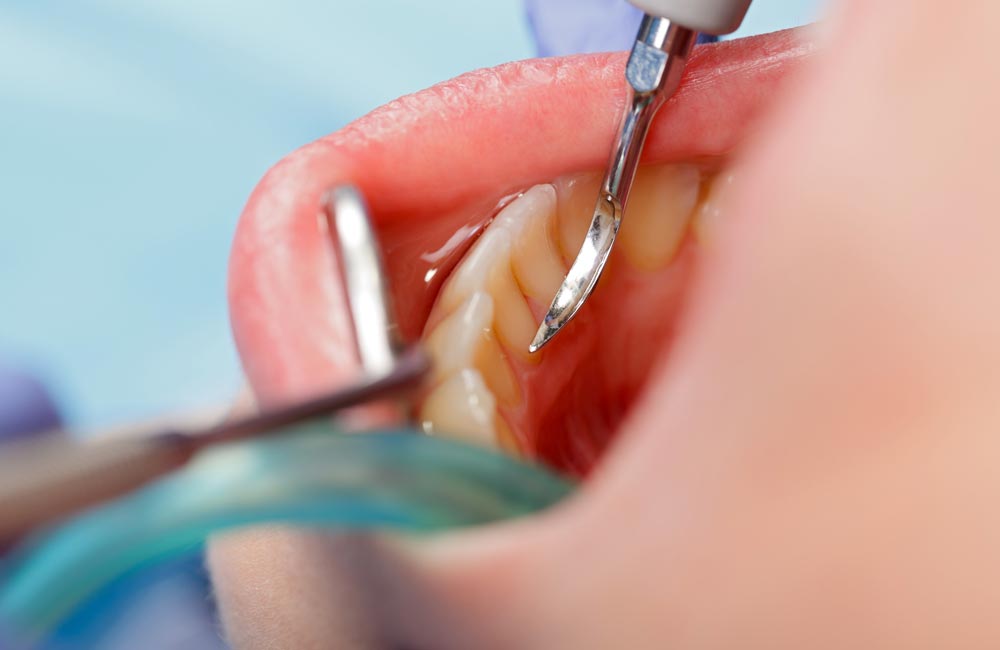CALL US NOW!
Blog Layout

A tooth infection is one of the most serious issues that you could have with your dental health. When a tooth is infected, the infection can travel into your blood and into your bones. When this occurs, it can be life-threatening. Yet tooth infections can seem a lot like regular cavities, and that can lead people to ignore them.
Here's what you need to look out for.
1. Flu-Like Symptoms
When an infection has spread, you may experience a fever, difficulty eating, and general flu-like symptoms. It may be easy to write off these symptoms as being a cold or a flu rather than a more serious infection. But an infection will persist and get worse, while a flu or cold will gradually get better.
Another flu-like symptom you might experience is swelling in your lymph nodes. If your lymph nodes swell, this generally means that your body's immune system is fighting off something significant.
If you have flu-like symptoms while also experiencing issues with your teeth, you should suspect that an infection has occurred.
A dentist will be able to X-ray your teeth to find out whether an infection is present before giving you treatment. If you have a swollen jaw or cheek during this time, this will indicate that it's more likely to be a dental infection than anything else.
2. Tooth Sensitivity
Sometimes teeth can be generally sensitive. Some people get used to tooth sensitivity over time. But a tooth that is constantly sensitive likely has something wrong with it, such as an inflamed root. Even if the tooth is just a little sensitive, it could indicate an infection, and if the infection gets worse, it could lead to a root canal.
This is especially true if you have a filling in the tooth that's sensitive. Teeth with fillings are more likely to experience issues such as sensitivity and infection because it's easier for bacteria to enter them. If you have an old filling, it may have cracked, become loose, or otherwise leaked.
Some people have teeth that are naturally sensitive to cold or heat but for the most part tooth sensitivity is something that should be addressed by a professional.
3. Jaw Pain
One of the issues with identifying a tooth infection is that it can present as a jaw pain. Sometimes tooth pain doesn't feel localized around the tooth that's actually injured. Instead, you experience pain in your jaw, cheek, or even neck.
Jaw pain and jaw aching can also be the product of an infection. It's important to address any chronic or consistent pain that you experience, because it could indicate a more serious issue. Tooth pain also has a tendency to get worse quite suddenly.
4. Excessive Bleeding
Most people bleed a little when they floss or brush, but bleeding is usually indicative of poor gum health. And if you bleed a lot during your regular brushing and flossing, it could mean that you have issues with your gums that could be gum disease or infection.
If you're bleeding a lot, you should bring it up with your dentist. Your dentist can inspect your gums and complete X-rays to determine whether you have a serious issue with your teeth. Otherwise, you may just be brushing too hard, or you might need to floss more often.
Of course, tooth infections can also be completely asymptomatic. There are some infections that don't cause pain: instead, you might experience some mild sensitivity. An X-ray will reveal the infection and regular dental care is important.
Schedule an appointment with Jay A. Hollander, DDS
today. We can help make sure that your infection is diagnosed and taken care of. Call today!

By Admin
•
October 14, 2019
Some habits are great for your teeth. Others, such as eating candy throughout the day, are harmful. You likely recognize some harmful habits, but some are less well-known. Here are four bad habits that can harm your teeth and why they're so damaging. 1. Not Brushing Before Bed If you don't brush before bed, bacteria on your tooth surfaces can multiply all night long. You may think that one or two brushes during the day are fine. But if you don't brush your teeth before bed, you're leaving your teeth vulnerable. According to some dentists, night is the most important time to brush because your teeth have less saliva to protect them at night. And if you only brush in the mornings, the billions of bacteria in your mouth have free reign. One estimate is that the numbers of bacteria in your mouth could go from 20 billion to 100 billion in just 24 hours. If you only brush once a day, this could be happening in your mouth on a daily basis. Another effect of less frequent brushing is that your plaque could start to harden into tartar. Plaque can start hardening after just 48 hours or so. And the harder it gets, the less likely it will come off when you brush. One brush per day is not ideal, since any plaque you may miss in that one brushing can harden into tartar before the next brushing. 2. Sleeping on Your Back Some sleep conditions such as sleep apnea may harm your teeth by causing you to grind your teeth in your sleep (known as bruxism). This effect can be more pronounced if you're in the habit of sleeping on your back. Another way sleeping on your back can harm your teeth is through dry mouth. Your mouth can unconsciously come open when you sleep on your back, which allows your mouth to dry out for hours at a time while you sleep. Dry mouth can damage your teeth by depriving them of the saliva that fights bad bacteria and carries minerals to enamel. 3. Forgetting to Floss Because plaque can start to harden into tartar in just a couple of days, flossing every day is crucial. Even if you floss every other day instead of every day, you could allow some of the tartar between your teeth to harden. The spots between your teeth are much more of your tooth surface than you might realize; according to experts, about 40 percent of your tooth surface isn't cleaned when you brush because the brush can't reach it like floss can. 4. Chewing on Hard Objects Although your teeth have plenty of chewing power, they're not completely invincible. Chewing on hard objects frequently, especially ones that aren't considered food items, can damage your teeth. This habit commonly involves chewing on ice, fingernails, pencils or pens, un-popped popcorn, and similar objects, none of which you should expect your teeth to handle. The more often you chew on these types of objects, the more chances you have to chip, crack, or even break a tooth entirely. Even if you don't have a dramatically broken tooth, you could still damage your enamel when you chew on these objects. Hard objects can wear down your enamel as you chew on them. These bad habits can all harm your teeth in some way. If you struggle with a bad habit, talk to your dentist about solutions that can help you get your dental health back on track. For more information about the dental services we provide, get in touch with the office of Jay A. Hollander, DDS today.

By Admin
•
September 25, 2019
Whether your teeth are stained, chipped, missing, or crooked, you can choose a cosmetic procedure to improve your smile. Some cosmetic procedures take only a single dental appointment, while others can take months to complete. Here are some popular cosmetic dentistry procedures to enhance your appearance. Teeth Whitening Over-the-counter whitening strips and whitening toothpastes are popular and cost effective. Tray-based bleaching systems are also popular and can be obtained by your dentist or purchased at your local pharmacy. The tray-based bleaching procedure involves wearing a tray filled with a whitening solution that contains a hydrogen peroxide whitening agent. You will wear the dental tray anywhere from a couple hours each day to every night for one month or longer, depending on the extent of your dental staining and desired whitening degree. If you want a quicker solution to teeth whitening, consider a professional, in-office whitening procedure performed by your dentist. In-office bleaching procedures involve the application of the bleaching agent directly to your teeth. The whitening product can be used in conjunction with a special laser, or light, and excellent results are typically obtained after only a single treatment. For a deeper whitening effect, a few dental appointments are generally recommended, but dramatic results will typically follow just one visit. In-office whitening, while the quickest procedure to brighten your smile, is the most expensive whitening procedure. While the bleaching results are often dramatic, teeth whitening results are not permanent, and the procedure's durability depends on what you consume. When you consume foods and drinks that are known for dental staining, such as coffee, tea, red wine, and cola, the whiteness of your teeth will fade in about a month, or so. If you stay away from those, teeth whitening can last for over a year. Dental Veneers Dental veneers are typically made from resin-composite or porcelain. They are thin shells, or covers, that are affixed, or permanently bonded, to the front of your natural teeth to enhance their appearance. They are used to improve the appearance of chipped, broken, and stained teeth, and are typically used on the top front teeth. To apply veneers, your dentist grinds down the tooth enamel so that the material will stick better, and because of this, the procedure is irreversible. Your dentist may recommend a local anesthetic because the dental veneer procedure may cause slight discomfort. Unlike dental crowns, which encase your entire tooth, dental veneers only cover the front part of your tooth that is visible when smiling. The recovery process for dental veneers is brief. After the veneers are affixed to your teeth and after your local anesthetic wears off, eating and chewing can be resumed. Until the anesthetic has completely worn off, however, be careful when chewing to avoid accidentally biting your tongue or the insides of your cheeks. Your dental veneers may feel slightly rough in a few areas soon after your procedure, but the rough spots will resolve after a few days once you resume eating and brushing your teeth. Porcelain veneers generally last for up to 15 years, as long as you take care of them like you would your natural teeth. Taking the following precautions help ensure that your veneers last as long as possible. Avoid chewing on hard objects Don't use your teeth to open things Avoid clenching your teeth Eat hard foods with your back teeth Wear a mouthguard when playing sports If you damage a veneer despite following the above precautions, or if you experience sensitivity, see your dentist as soon as possible. Any sensitivity you feel following the removal of your dental enamel will quickly fade and your veneers will feel like your natural teeth. To learn more about cosmetic dentistry procedures such as veneers, tooth restoration, laser dentistry, or dental crowns, or to schedule an appointment, contact us today.

By Admin
•
September 25, 2019
Most people have had a chipped tooth at least once in their life. Chipped teeth can happen for all kinds of reasons. They can range from mild to severe. No matter what, they tend to be painful. They can also cause a person to become dissatisfied with their smile. Fortunately, there are many things you can do to avoid chipping a tooth. Take Great Care of Your Teeth Taking care of your teeth is important for many reasons. It protects you from gum disease and tooth decay. Plus, it will help you to be healthier and to enjoy a radiant smile. Caring for your teeth properly also makes you less susceptible to cavities. This is good since cavities weaken the teeth and can make them more prone to chipping. To reduce the risk of chipping and other serious problems, brush your teeth at least twice a day, floss regularly and see your dentist as recommended, usually at least twice a year. Avoid Candy and Other Hard Foods Another common reason for a chipped tooth is eating candy or other hard foods. Ice, which is also very hard, is another common culprit. For this reason, you should never chew on or bite down on ice. Hard foods and candies especially can be rough on the teeth. One wrong bite and you could easily chip off a large section of the tooth. If you must eat candy, try to stick to softer, less damaging candies. And, as a general rule, eat these types of foods only infrequently since sugary foods can also be bad for your teeth and can promote chipping and cavities. Wear Protective Gear when Playing Sports Many people play sports in which balls and other objects whiz toward their faces, often at high speeds. As you can imagine, taking a ball or a puck to the mouth can do some serious damage. In fact, chipped teeth are often one of the less severe results of this type of trauma. Fortunately, you do not have to give up your favorite sport. Instead, always wear all of the required protective gear, as well as a mouthguard to keep your smile looking great and free of chips. Don't Grind Your Teeth Tooth grinding is a common problem. Some people grind their teeth together out of habit. Others do it while they sleep, often without realizing it. Your dentist will notice and alert you if you appear to be grinding your teeth. This professional can also provide treatment options, such as protective mouth gear to be worn at night, that can prevent grinding and its effects, which can include teeth that chip more easily. To avoid the hazards of tooth grinding, regular dental visits and being willing to follow your dentist's advice is key. Avoid Acidic Foods and Drinks Many people enjoy foods and drinks that are acidic. These can include things like wine, soda, and citrus fruits. Acidic foods and beverages can cause wear and tear on the teeth by wearing away the enamel, which, unfortunately, cannot be rebuilt. Once enamel is destroyed, the tooth becomes weaker and much more likely to chip. Because acid erosion is such a serious problem, you should take care to avoid acidic foods and drinks or to at least enjoy them in moderation. Also, you should have your dentist monitor you carefully for signs of erosion if you have had issues with it in the past. Everyone wants a beautiful smile free of chipped teeth. However, you can play a major role in protecting your teeth and your smile. By following this advice and finding a great dentist, like the experts at Jay A Hollander, DDS , you can maintain a beautiful smile for life.

By Admin
•
September 25, 2019
If you've ever run your tongue over your teeth after a long day, you'll be familiar with that fuzzy coating that forms on their surface. This coating is called plaque, and it plays a huge role in your dental health -or lack thereof. If you can keep plaque under control, then you can keep cavities and gum disease under control too. Keep reading to learn more about plaque, how it causes damage, and what you can do about it. What Is Plaque? This fuzzy, slimy substance is comprised of a mixture of saliva, sugars from your food, bacteria that feed on the sugar, and acids secreted by those bacteria. Everyone develops plaque on their teeth. Its appearance does not meant that there is anything wrong with you, or that there is anything wrong with the way you are caring for your teeth. What Damage Does Plaque Cause? Problems arise not when plaque forms, but when you leave it for too long. The acids secreted by the bacteria in the plaque slowly begin to eat away at your tooth enamel, eventually leading to cavities. The bacteria themselves may also work their way down beneath your gums, leading to a gum infection known as gingivitis - which can lead to redness, swelling, and soreness. How Do You Get Rid of Plaque? The simplest way to remove plaque from your teeth is with proper tooth brushing. Brush at least two times per day , spending at least two minutes on the task. Make sure you thoroughly brush each surface of each tooth. If you routinely skip the same spots, those places are where you're most likely to develop decay and gum disease. WebMD recommends to floss daily to remove plaque from between your teeth. If you find flossing difficult, here are a few tips to make this task easier: Use a long strand of floss - long enough to wrap it around a finger from each hand. Use thin, waxed floss if your teeth are very close together. Use a floss holder to help you reach your back teeth. If flossing is uncomfortable or causes your gums to bleed, you may have gingivitis. Keep flossing; it should become more comfortable soon. Talk to your dentist if the bleeding and discomfort do not subside within a week or two. What Happens to Plaque if You Don't Remove It? Here's an even bigger reason to remove plaque regularly: it will turn into tartar if you do not. Tartar is a hardened form of plaque. It will form, primarily along your gum line, if you skip tooth brushing or neglect flossing. Tartar is too hard for you to remove on your own; your dental hygienist must remove it with special tools. So until you go in for your regular cleaning appointment, the tartar just sits there, all the while trapping bacteria against your teeth and gums, increasing your risk of tooth decay and gum disease. What Habits Increase Plaque Formation? In addition to removing plaque often, you can also take steps to reduce the amount of plaque that forms on your teeth. Eat fewer sugary foods and avoid sugary drinks. The bacteria in your mouth won't have as much to feed on, so they won't replicate as quickly - and you'll have less plaque. Also sip water after you eat. It will rinse some of the sugar and bacteria off your teeth before plaque has a chance to form. Keep in mind that even with proper brushing and flossing, most people do experience some tartar buildup over time. Schedule regular cleaning appointments to keep your teeth in good health. Contact Jay A. Hollander, DDS , to set up an appointment.

By Admin
•
April 9, 2019
Getting dental crowns can seem overwhelming, especially if you've never gotten one before. However, whether you're just getting one to strengthen a tooth, or you need a smile makeover on weak teeth, they are a great choice to consider. If you believe you may need a crown, check out what you can expect when you get one.

By Admin
•
February 13, 2019
Having bad breath sometimes is normal. You may have a foul odor in your mouth after eating a certain food or because you are not drinking enough water. However, halitosis, which is a chronic form of bad breath, is a cause for concern. While shocking to learn, about 60 million people in the United States have chronic halitosis. Most people with halitosis invest in chewing gum, mints, and even breath spray to improve the smell of their breath. Unfortunately, these products only mask the issue rather than address the cause of the odor. If you have halitosis, help is available. This guide will explain the causes of and treatment options for chronic halitosis.

By Admin
•
December 5, 2018
When you've got a cavity, you need to remove it to prevent further damage to your teeth. The dentist fills the resulting space with either a composite filling, which is tooth-colored, or a metal or amalgam filling, which is typically a mix of silver, copper, tin, zinc, and mercury. Each type of filling has its pros and cons.

By Admin
•
October 14, 2018
Laser dentistry is gaining traction in the market and is common in many dental offices across the country. Available in a range of different powers, dental lasers have been approved by the ADA for everything from decay removal and gingival contouring to teeth whitening and root canals. This post lists three advantages of laser dentistry, and why you should consider working with a dentist who offers this powerful service.
Browse Our Website
Contact Information
PHONE:
317-259-1501
ADDRESS:
1305 W 86th St. Indianapolis, IN 46260
EMAIL:
info@hollanderdentistry.com
BUSINESS HOURS:
- Mon, Wed, Thu
- -
- Tuesday
- -
- Friday
- -
- Sat - Sun
- Closed
(First 2 Fridays of the Month)



Care Credit; Most Major Insurance Accepted
Visit Our Location
Content, including images, displayed on this website is protected by copyright laws. Downloading, republication, retransmission or reproduction of content on this website is strictly prohibited. Terms of Use
| Privacy Policy



